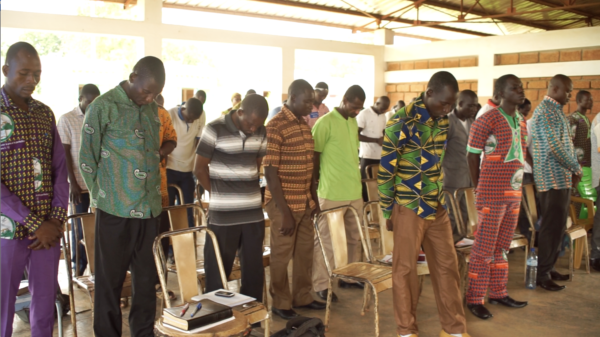 INTEGRATING PHYSICAL & SPIRITUAL
INTEGRATING PHYSICAL & SPIRITUAL
“For God was pleased to have all His fullness dwell in him, and through Him to reconcile to Himself all things, whether things on earth or things in heaven, by making peace through His blood, shed on the cross.”
– Colossians 1:19-20
The Sacred-Secular Divide
Wherever we have traveled in the world—from Africa to the United States, from Asia to Europe, from New Zealand to Latin America—many Christians firmly believe that some things are sacred, and therefore more valuable to God, while other things are secular, and therefore less important to God. Sacred things include spiritual disciplines, faith, grace, theology, and evangelism. Business, politics, economy, science, mass media, and the arts fall into the second category of secular pursuits. This divide extends to ministry, meaning we end up with two areas: missions or development. Teaching people about God or helping the poor. Loving God or loving our neighbor.
The Truth
This isn’t what the Bible teaches at all. Actually, the story of scripture is that God, in Christ, created all things in heaven and earth (Genesis 1:1, John 1:1-3) and that Christ’s mission on earth was to reconcile all things to Himself (Colossians 1:19-20). As His followers, we are commanded to do everything for His glory (1 Corinthians 10:31). This biblical understanding of an integrated life completely changes how we seek to work among vulnerable people.
A New Starting Place
When poverty and injustice got labeled as “secular” problems, we stopped looking to God for solutions and started relying on experts, global leaders, and best practices. But all of our human wisdom and resources have failed to fix the brokenness in our world. An integrated approach requires us to start with the Bible and ask, “What does God say about this problem and how to solve it?”
A New Goal and Vision
The goal of all of life is to glorify God. Our vision is that His Kingdom would spread over all the earth—understanding that His Kingdom is everywhere that He is glorified and His will is done. This is our message to churches and communities. We challenge them to seek God’s glory and to participate in building His Kingdom, rather than focusing on improving their lives.
A New Approach
An integrated approach recognizes that discipleship and development are not two separate things. They flow naturally into each other. We teach churches the Bible’s commands to love and serve others, to steward all His gifts, and to bring every area of life under the lordship of Christ. In thousands of communities, we’ve seen Christians’ faith strengthened, poverty alleviated, and God glorified as His people have sought to be obedient.
Examples From Our Work
The Wholistic Development Center (WDC) seeks to provide vocational skills and discipleship to young adults who have grown up in rural poverty. During the two-year program, students are nurtured physically, spiritually, mentally, and physically. The staff live on campus and invest constantly in deepening relationships with the students. They will point to a student’s improved work ethic as an example of spiritual growth. Daily Bible studies teach students how to apply God’s word to every area of life. And their future vocations can glorify God as well as providing for themselves and their families, as local employers recognize WDC graduates as honest, hard working, dependable, and skilled.

In our Truth Centered Transformation program, we’ve seen many times how God uses His people’s obedience to love and serve others to deepen their relationship with Him. Although we provide only a few days of training each year (much of it on topics like “when to wash your hands”), our partner churches grow so much spiritually. When we’ve asked the churches about it, they explained, “You taught us to love our neighbors. When we went out to do that, we faced all sorts of opposition….So we would pray, and God would answer our prayers. And because of the way God answered our prayers, we saw that He loves us so much. And we wanted to learn more about Him, so we started to pay attention in church and read our Bibles more.”

‘INTEGRATING PHYSICAL & SPIRITUAL’ BOOKLET
If you want to go deeper in understanding what this principle is and how you can apply it – this booklet gives more information.
GO DEEPER
If you want to learn more about this principle and how to apply it, you can find articles and a free downloadable booklet at the Framework for Transformation website.
FROM THE BLOG
Here are two of our favorite blog posts related to the core principle Integrating Physical & Spiritual. You can read more related posts here.

Housebuilding: TCT Asia
God is at work through the church. This video tells the story of an Act of Love from a community we work with in Asia. It’s an inspiring example of how their church is being obedient to God and loving their neighbors with joy.

The Importance of the Whole Story
As we evangelise, especially cross-culturally, we need to tell the whole story. We need to make sure people have context for the salvation narrative.

